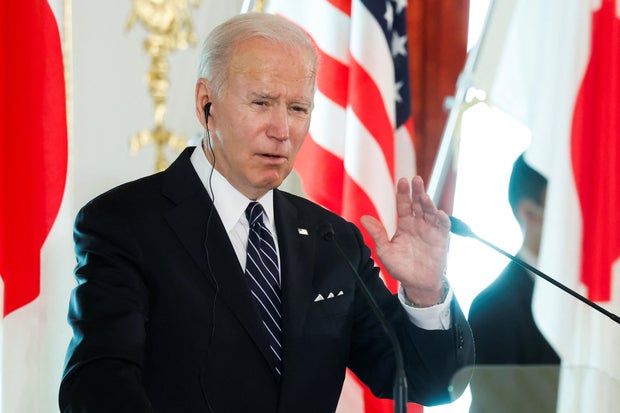Biden says U.S. would intervene militarily if China invades Taiwan
Tokyo — President Biden said Monday the U.S. would intervene militarily if China were to invade Taiwan, in one of the most forceful and overt statements of American government support for Taiwan in decades. Mr. Biden said the burden to protect the self-ruled island was “even stronger” after Russia’s invasion of Ukraine.
Speaking at a joint news conference in Tokyo with Japanese Prime Minister Fumio Kishida, Mr. Biden was asked by CBS News correspondent Nancy Cordes, “Are you willing to get involved militarily to defend Taiwan if it comes to that?”
He replied, simply, “Yes.”
Cordes followed up by asking, “You are?”
“That’s the commitment we made,” Mr. Biden said. “We agree with a ‘One China’ policy. We signed onto it and all the attendant agreements made from there. But the idea that it [Taiwan] could be taken by force, just taken by force, it’s just not — it’s just not appropriate. It’ll dislocate the entire region and be another action similar to what happened in Ukraine. And so it’s a burden that is even stronger.”
The president then said U.S. “policy towards Taiwan has not changed at all,” stressing his government’s commitment to “the peace and stability across the Taiwan Strait, and ensuring that there’s no unilateral change to the status quo.”
Mr. Biden said it was his “expectation” that China would not try to seize control of Taiwan by force, but he added that “a lot of it depends upon just how strong the world makes clear that that kind of action is going to result in long term disapprobation by the rest of the [international] community.”
The president said Beijing was “flirting with danger” with recent military flights close to Taiwan.
Beijing was quick to respond, with Foreign Ministry spokesman Wang Wenbin warning: “No one should underestimate the firm resolve, staunch will and strong ability of the Chinese people in defending national sovereignty and territorial integrity,” according to French news agency AFP.
It was the second time within a year that Mr. Biden has left people questioning his administration’s stance on the long-held, unofficial U.S. government policy of “strategic ambiguity” on Taiwan. In October 2021, after being asked during a CNN Town Hall in Maryland whether the U.S. would defend Taiwan in the face of an attack by China, he said: “Yes, we have a commitment.”
Soon after he made the remarks the White House released a statement insisting, as Mr. Biden did after his comments in Tokyo on Monday, that there had been no change in official U.S. policy on Taiwan.
JONATHAN ERNST / REUTERS
Under the “One China” policy the U.S. recognizes Beijing as the government of all of China and doesn’t have engage in official diplomatic relations with Taiwan. However, Washington maintains unofficial contacts with Taiwan, including a de facto embassy in Taipei, its capital. The U.S. also supplies military equipment for the island’s defense.
Ukraine
Mr. Biden also said on Monday that Russia “has to pay a long-term price” for its “barbarism in Ukraine” in the form of sanctions on Moscow from the U.S. and its allies.
He said Russian President Vladimir Putin was trying to eliminate “the identity of Ukraine” since he “can’t occupy it.”
The president said if “the sanctions are not continued to be sustained in many ways, then what signal does that send to China about the cost of attempting to take Taiwan by force?”
The U.S. has steadfastly refused to get directly involved in the Ukraine war, instead supplying military and economic aid to the war-torn nation.
Recession
When asked if a recession is inevitable in the U.S., Mr. Biden replied simply, “No.”
That’s despite record high inflation and supply shortages caused partly by Russia’s invasion of Ukraine.
He acknowledged the American economy has “problems,” but said it was better positioned than other countries.
“We have problems that the rest of the world has,” Mr. Biden said, “but less consequential than the rest of the world has.”
Mr. Biden acknowledged the…
Read More: Biden says U.S. would intervene militarily if China invades Taiwan


